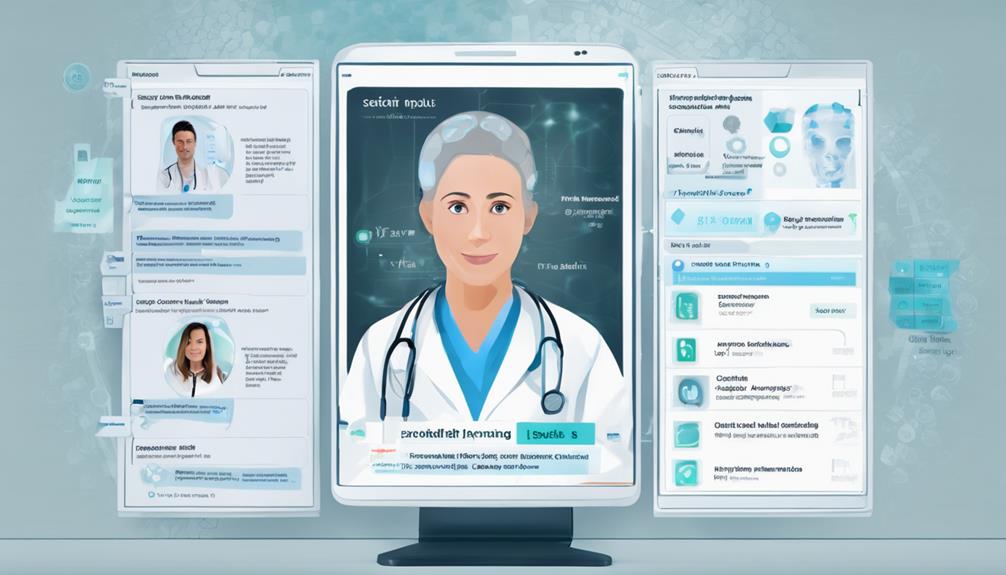The integration of artificial intelligence (AI) in healthcare is reshaping traditional practices and raising questions about the evolving role of doctors.
With advancements in AI technology, various tasks and responsibilities traditionally carried out by healthcare professionals are being automated and optimized, presenting both opportunities and challenges in the field.
As AI continues to expand its reach in the healthcare sector, understanding the nuances of its impact on medical practice and patient care becomes increasingly crucial.
Key Takeaways
- AI enhances diagnostic accuracy and efficiency, reducing the need for human doctors in disease identification.
- Precision medicine algorithms customize treatments based on individual patient data, surpassing traditional methods.
- AI-driven surgery systems improve precision and outcomes, potentially replacing human surgeons in certain procedures.
- Radiology AI algorithms swiftly analyze scans, aiding in faster and more accurate diagnoses, potentially reducing the reliance on radiologists.
AI Diagnosing Diseases
AI technology is revolutionizing the field of healthcare by surpassing traditional diagnostic methods in accurately identifying diseases such as cancer and diabetic retinopathy. AI algorithms have shown superior performance to human doctors in diagnosing various illnesses, leading to earlier detection and more precise identification. Through advanced data analysis, AI systems can reduce misdiagnosis rates and enhance patient care by improving health outcomes. The utilization of AI in diagnostic tests not only streamlines the disease diagnosis process but also enhances the overall efficiency of healthcare delivery.
Studies have highlighted the potential of AI to transform the way diseases are diagnosed by providing insights that were previously unattainable through conventional methods. By leveraging AI technology, healthcare professionals can offer more personalized and effective treatment plans, ultimately leading to better outcomes for patients. The integration of AI into diagnostic procedures underscores the evolving landscape of healthcare, where technology plays a crucial role in augmenting the expertise of medical practitioners.
Virtual Health Assistants

The evolution of healthcare technology has brought forth a new era in patient care with the emergence of virtual health assistants powered by advanced algorithms. These AI-driven virtual assistants are revolutionizing healthcare delivery by providing personalized healthcare recommendations based on patient data.
Here are some key points about virtual health assistants:
- Virtual health assistants can offer real-time monitoring and support for chronic disease management.
- Patients can access healthcare information and guidance 24/7 through these assistants.
- They assist in medication management, symptom tracking, and provide lifestyle recommendations.
- These assistants are becoming increasingly sophisticated, enhancing patient engagement.
- Virtual health assistants empower individuals in their healthcare journey by helping them take control of their health with the aid of AI technology.
Through the integration of AI, virtual assistants are reshaping the way healthcare is delivered, making it more accessible and personalized for patients seeking continuous support and guidance in managing their health.
Precision Medicine Recommendations
Analyzing individual patient data, precision medicine recommendations utilize AI algorithms to tailor personalized treatment plans. By harnessing machine learning, AI can predict optimal drug choices and dosages based on a patient's unique characteristics. These algorithms take into account genetic, environmental, and lifestyle factors to customize treatment strategies for precision medicine. The use of AI in precision medicine allows for the identification of targeted therapies that may not be readily apparent through traditional approaches, ultimately enhancing treatment outcomes.
Through the analysis of vast amounts of patient data, AI can suggest personalized treatment options that consider the individual nuances of each case. By providing tailored recommendations, AI aims to improve treatment effectiveness while minimizing adverse reactions. The integration of AI in precision medicine represents a significant advancement in healthcare, offering the potential for more precise and effective interventions. AI-driven precision medicine is poised to revolutionize healthcare by delivering individualized care plans that optimize patient outcomes.
AI-Powered Surgery

Utilizing cutting-edge technology, modern surgical systems enhanced by artificial intelligence are transforming the landscape of medical procedures with unprecedented precision and control. AI-powered surgery systems, such as the da Vinci Surgical System, have revolutionized the field by enabling surgeons to perform minimally invasive procedures with enhanced accuracy. These systems leverage advanced robotics and AI algorithms to analyze real-time data, providing surgeons with detailed insights and guidance during complex surgeries.
The integration of artificial intelligence in robotic surgery not only improves surgical outcomes and reduces complications but also shortens recovery times for patients. Moreover, the remote operability of AI-powered surgical systems allows for expert surgical care to reach underserved areas and facilitates collaboration among specialists. In essence, AI-powered surgery is reshaping the healthcare industry by amalgamating the expertise of skilled surgeons with the precision and efficiency of artificial intelligence technologies.
Automated Radiology Interpretation
Automated radiology interpretation through AI algorithms has demonstrated superior accuracy in analyzing medical imaging scans, surpassing human radiologists in diagnostic efficiency. AI systems excel in interpreting radiology scans by reducing errors and enhancing diagnostic precision.
These AI-powered tools swiftly analyze vast amounts of medical imaging data, aiding in the timely detection of abnormalities. The use of AI in radiology interpretation not only improves diagnostic efficiency but also enhances workflow efficiency by handling large volumes of scans effectively.
By complementing the work of radiologists, AI contributes to better patient care through increased diagnostic accuracy. The integration of AI in automated radiology interpretation represents a significant advancement in healthcare, providing a reliable and efficient method for analyzing complex imaging data.
As technology continues to evolve, the synergy between AI algorithms and radiologists is poised to revolutionize the field of radiology interpretation, setting new standards in diagnostic capabilities and patient outcomes.
Telemedicine and Remote Monitoring

In the realm of healthcare innovation, the integration of AI technology extends beyond automated radiology interpretation to revolutionize patient care through telemedicine and remote monitoring solutions. Telemedicine platforms powered by AI facilitate remote consultations, diminishing the necessity for in-person doctor visits.
AI-driven remote monitoring systems enable real-time tracking of patient data, empowering proactive healthcare interventions. Virtual health assistants leverage AI algorithms to deliver personalized care and guidance to patients directly from their homes.
Additionally, AI plays a crucial role in remote diagnosis by utilizing advanced algorithms to analyze patient symptoms and medical history. Moreover, remote patient monitoring devices equipped with AI technology significantly enhance chronic disease management and improve treatment outcomes.
These advancements in telemedicine and remote monitoring showcase the potential of AI to augment patient care, increase accessibility, and optimize healthcare delivery in a technologically driven world.
Drug Discovery and Development

Artificial intelligence (AI) plays a pivotal role in revolutionizing drug discovery and development processes. By swiftly analyzing extensive datasets, AI expedites the identification of potential drug candidates and molecular structures for new medications.
This technological advancement enhances precision medicine, leading to improved treatment approaches for various diseases.
Faster Drug Discovery
Utilizing advanced AI technologies, the healthcare industry has witnessed significant advancements in accelerating drug discovery processes. AI efficiently analyzes extensive datasets to pinpoint potential drug candidates, streamlining development by predicting efficacy and safety through machine learning algorithms. AI models simulate drug interactions and side effects, reducing the need for extensive lab testing. By analyzing molecular structures and biological data, AI enables targeted drug design tailored to specific diseases. Pharmaceutical companies leverage AI to optimize drug development pipelines, resulting in faster and more cost-effective research outcomes.
- AI accelerates drug discovery by analyzing vast amounts of data to identify potential drug candidates.
- Machine learning algorithms help predict the efficacy and safety of new drugs, streamlining the development process.
- AI models can simulate drug interactions and side effects, reducing the need for extensive testing in labs.
- By analyzing molecular structures and biological data, AI enables targeted drug design for specific diseases.
- Pharmaceutical companies leverage AI to optimize drug development pipelines, leading to faster and more cost-effective research outcomes.
Precision Medicine Advancements
Advancements in precision medicine for drug discovery and development are propelled by AI's capability to analyze vast amounts of data and predict patient responses to specific treatments. By leveraging AI technologies, researchers can identify genetic markers and biomarkers that play crucial roles in tailoring treatment strategies to individual patients. The integration of AI in drug development processes has significantly enhanced the identification of new drug targets and pathways, revolutionizing the field of precision medicine. Machine learning algorithms assist in predicting patient responses, enabling personalized medicine approaches that consider individual variability. This precision-driven approach not only accelerates drug discovery but also leads to the development of targeted therapies that offer more effective and tailored treatment options for patients.
| Precision Medicine Advancements | |
|---|---|
| AI Accelerates Drug Discovery | Identifies Potential Compounds |
| Machine Learning Predictions | Personalized Medicine |
| Genetic Markers and Biomarkers | Tailored Treatment Strategies |
| New Drug Targets Identification | Revolutionizing Precision Medicine |
Improved Treatment Approaches
In the realm of drug discovery and development, advanced technologies are reshaping treatment approaches to enhance efficacy and precision.
- AI accelerates drug discovery by analyzing massive datasets to identify potential compounds and predict their effectiveness.
- Machine learning algorithms optimize drug development processes, reducing time and costs associated with traditional methods.
- AI-driven simulations and modeling enhance understanding of molecular interactions, aiding in the design of more effective and targeted medications.
- Virtual screening tools powered by AI enable efficient screening of compounds for specific biological targets, streamlining the drug discovery pipeline.
- AI algorithms analyze genetic data to identify biomarkers for personalized medicine, leading to the development of tailored treatment approaches for patients.
Personalized Patient Care Plans

AI in healthcare is revolutionizing personalized patient care plans. It offers tailored treatment recommendations, customized medication schedules, and automated progress monitoring.
By leveraging machine learning algorithms, AI can analyze vast amounts of patient data. This analysis creates individualized care plans that consider factors such as genetics, lifestyle, and medical history.
These advanced technologies enable healthcare providers to deliver more precise and effective treatments. This, in turn, enhances patient outcomes and overall quality of care.
Ai-Driven Treatment Recommendations
Utilizing advanced algorithms and patient-specific data, AI-driven treatment recommendations revolutionize healthcare by crafting personalized care plans tailored to individual needs. These recommendations are based on thorough patient data analysis, taking into account factors such as medical history, genetics, and lifestyle choices to suggest optimal treatment options.
AI's capability to process vast amounts of data enables it to recommend treatments aligned with the latest medical research and guidelines. Moreover, these systems continuously learn and adapt, providing real-time updates to ensure patients receive the most effective care.
Ultimately, AI-driven personalized patient care plans enhance treatment outcomes, boost patient satisfaction, and optimize healthcare resource utilization.
Tailored Medication Schedules
Tailored medication schedules, driven by advanced algorithms analyzing patient data, optimize treatment plans according to individual healthcare requirements. AI processes patient-specific information such as medical history, genetic factors, and treatment responses to create personalized medication schedules.
By dynamically adjusting dosages and timings, AI ensures both patient safety and treatment efficacy. These personalized care plans play a crucial role in reducing medication errors and enhancing patient outcomes by adapting to changes in health conditions.
Moreover, automating medication scheduling through AI leads to improved patient adherence, resulting in better disease management and overall health outcomes. AI's ability to customize medication schedules based on individual needs is revolutionizing healthcare by providing precise and effective treatment strategies.
Automated Progress Monitoring
Automated progress monitoring in healthcare involves the systematic analysis of real-time patient data to tailor personalized care plans and optimize treatment strategies. AI systems play a pivotal role in this process, revolutionizing healthcare management. Here are key points to consider:
- AI systems can automatically monitor patient progress by analyzing real-time data, vital signs, and treatment responses.
- These systems can generate personalized patient care plans based on individual health data and medical history.
- AI algorithms track changes in patient condition, alert healthcare providers to potential issues, and recommend interventions.
- Automated progress monitoring by AI enhances efficiency, accuracy, and timeliness in adjusting treatment plans.
- The use of AI in progress monitoring allows for proactive healthcare management, leading to improved patient outcomes and reduced healthcare costs.
AI-Assisted Clinical Trials

AI's integration into clinical trials revolutionizes the research landscape by optimizing participant selection, data analysis, and result interpretation. AI algorithms play a crucial role in enhancing patient recruitment for clinical trials. By efficiently matching participants with specific criteria, AI streamlines the selection process, leading to more targeted and successful trials. Additionally, AI assists in monitoring trial participants remotely, improving data collection accuracy, and reducing the necessity for in-person visits. These advancements not only enhance the efficiency of data collection but also contribute to a more seamless and patient-centric trial experience.
Moreover, AI tools are instrumental in analyzing trial results, identifying trends, and predicting the potential success rates of new treatments. This analytical power expedites the drug development process by optimizing trial designs, reducing costs, and accelerating overall research timelines. Through AI-assisted clinical trials, researchers can make more informed decisions, increase the speed of bringing new medications to market, and ultimately improve patient outcomes.
Administrative and Workflow Automation

AI's impact on healthcare administration is significant. It streamlines appointment scheduling, enhances billing accuracy, and improves data organization. Through automation, AI optimizes these processes, reducing the burden on healthcare professionals and ensuring smoother operations.
The integration of AI in administrative tasks ultimately leads to improved efficiency and better patient outcomes.
Streamlining Appointment Scheduling
Enhancing healthcare operational efficiency, appointment scheduling in healthcare settings is being revolutionized through the integration of advanced AI systems. By leveraging AI for appointment scheduling, healthcare facilities can streamline operations and enhance workflow efficiency. Here is how AI is transforming appointment scheduling:
- AI systems automate appointment scheduling, reducing administrative burden on staff.
- Algorithms analyze patient data to suggest suitable appointment times.
- Optimized scheduling leads to reduced wait times and increased patient satisfaction.
- Healthcare providers can focus more on patient care rather than administrative tasks.
- Overall, AI's role in appointment scheduling improves healthcare service delivery and patient experience.
Enhancing Billing Accuracy
Utilizing advanced algorithms and automation, healthcare organizations are significantly improving billing accuracy and operational efficiency through the integration of AI systems. AI systems streamline billing processes, increasing accuracy, reducing errors, and enhancing revenue capture.
By automating administrative tasks, AI ensures compliance with complex healthcare regulations, minimizes manual errors, and speeds up the billing cycle. This automation optimizes revenue cycle management, leading to cost savings for healthcare organizations.
AI algorithms analyze billing data with precision, reducing billing discrepancies and improving coding accuracy. Overall, AI-powered tools transform billing operations by minimizing denials, enhancing financial performance, and optimizing the revenue cycle management in healthcare settings.
Improving Data Organization
Automating data organization in healthcare through advanced AI systems enhances efficiency in managing patient information and medical records. AI streamlines administrative tasks by organizing patient records and automating workflows, reducing the burden on healthcare professionals.
AI applications categorize and prioritize patient data for easy access and analysis, improving data organization. These tools ensure seamless integration of medical data across platforms, providing accurate and up-to-date information for healthcare providers.
Frequently Asked Questions
How Can AI Replace Doctors?
AI can replace doctors by leveraging advanced algorithms to diagnose diseases with higher accuracy, interpret medical imaging efficiently, detect subtle anomalies, process vast medical data rapidly, and enhance overall efficiency in healthcare delivery.
What Are Some Ways AI Will Change Healthcare?
AI in healthcare will transform patient outcomes through precise diagnoses, personalized treatments, optimal resource utilization, and enhanced data analysis. It will revolutionize healthcare by improving accuracy, efficiency, and accessibility, ultimately leading to better patient care and outcomes.
What Medical Specialties Will Be Replaced by Ai?
AI has the potential to replace or augment professionals in radiology, pathology, dermatology, ophthalmology, cardiology, and gastroenterology. Its accuracy in interpreting medical imaging, analyzing tissue samples, diagnosing skin conditions, detecting eye diseases, and automating tasks is reshaping healthcare.
How AI Is Changing Medical Practice?
AI is transforming medical practice through enhanced diagnostics and early disease detection. Its precision and efficiency surpass traditional methods, heralding a new era in healthcare. Radiologists and pathologists may see a shift in roles due to AI advancements.
Conclusion
In conclusion, the profound impact of AI in healthcare is undeniable, with its ability to revolutionize various aspects of medical practice.
The integration of AI technologies in diagnosing diseases, personalized patient care plans, and drug discovery is reshaping the healthcare landscape.
As AI continues to evolve and replace doctors in healthcare, the potential for improving operational efficiency and enhancing patient outcomes is limitless.
The future of healthcare with AI is not just promising, but truly transformative.









